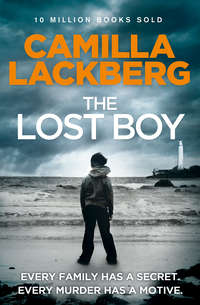
Полная версия
The Stonecutter

CAMILLA LACKBERG
The Stonecutter
Translated from the Swedish
by Steven T. Murray

Copyright
This novel is entirely a work of fiction. The names, characters and incidents portrayed in it are the work of the author’s imagination. Any resemblance to actual persons, living or dead, events or localities is entirely coincidental.
HarperCollinsPublishers Ltd.
1 London Bridge Street
London SE1 9GF
www.harpercollins.co.uk
First published by HarperCollinsPublishers 2010
Copyright © Camilla Lackberg 2005
Published by agreement with Nordin Agency, Sweden
English translation © Steven T. Murray 2008
Camilla Lackberg asserts the moral right to be identified as the author of this work
Cover Design © www.blacksheep-uk.com
A catalogue record for this book is available from the British Library
All rights reserved under International and Pan-American Copyright Conventions. By payment of the required fees, you have been granted the non-exclusive, non-transferable right to access and read the text of this ebook on-screen. No part of this text may be reproduced, transmitted, downloaded, decompiled, reverse engineered, or stored in or introduced into any information storage and retrieval system, in any form or by any means, whether electronic or mechanical, now known or hereinafter invented, without the express written permission of HarperCollins ebooks
HarperCollinsPublishers has made every reasonable effort to ensure that any picture content and written content in this ebook has been included or removed in accordance with the contractual and technological constraints in operation at the time of publication
Source ISBN: 9780007253975
Ebook Edition © MARCH 2010 ISBN: 9780007351855
Version: 2017-10-18
To Ulle All possible happiness
Table of Contents
Title Page
Copyright
Dedication
Chapter 1
Chapter 2
Chapter 3
Chapter 4
Chapter 5
Chapter 6
Chapter 7
Chapter 8
Chapter 9
Chapter 10
Chapter 11
Chapter 12
Chapter 13
Chapter 14
Chapter 15
Chapter 16
Chapter 17
Chapter 18
Chapter 19
Chapter 20
Chapter 21
Chapter 22
Chapter 23
Chapter 24
Chapter 25
Chapter 26
Chapter 27
Chapter 28
Chapter 29
Chapter 30
Chapter 31
Chapter 32
Chapter 33
Chapter 34
The Stranger
Keep Reading
About the Author
By the Same Author
About the Publisher
1

The lobster fishery was not what it once was. Back then, hard-working, professional lobstermen trapped the black crustaceans. Now, summertime visitors spent a week fishing for lobsters purely for their own enjoyment. And they didn’t obey the regulations either. He had seen plenty of it over the years. Brushes discreetly used to remove the visible roe from the females to make the lobsters look legal, poaching from other people’s pots. Some people even dived into the water and plucked the lobsters right out of the pots. Sometimes he wondered where it would all end and whether there was any honour left among lobstermen. On one occasion there had even been a bottle of cognac in the pot he pulled up, instead of the unknown number of lobsters that had been stolen from it. At least that thief had some honour, or a sense of humour.
Frans Bengtsson sighed deeply as he stood hauling up his lobster-pots, but his face brightened when he saw two marvellous lobsters in the first pot. He had a good eye for where lobsters tended to congregate, as well as a number of favourite spots where the pots could be placed with the same luck from one year to the next.
Three pots later and he had accumulated a passable heap of the valuable creatures. He didn’t really understand why they commanded such scandalous prices. Not that they were unappetizing in any way, but if he had to choose he’d rather have herring for dinner. They were tastier and a better buy. But the income from the lobster fishery was a more than welcome addition to his pension at this time of the year.
The last pot seemed to be stuck, and he stood with his foot on the rail of the boat for a bit more support as he tried to wrench it loose. He felt the pot slowly begin to give, and he hoped it wasn’t damaged. He peered over the rail of his old wooden snipa to see what sort of shape it was in. But it wasn’t the pot that came up first. A white hand broke the heaving surface of the water, looking for a moment like it was pointing at the sky.
His first instinct was to release the line and let whatever was floating beneath the surface vanish into the depths again along with the lobster-pot. But then his expertise took over, and he resumed pulling on the line that was attached to the pot. He still had a good deal of strength in his body, and he needed it. He had to haul with all his might to manoeuvre his macabre find over the rail. He didn’t lose his composure until the pale, lifeless body fell to the deck with a thud. It was a child he’d pulled up from the sea. A girl, with her long hair plastered round her face, and lips just as blue as her eyes, which now stared unseeing at the sky.
Bengtsson threw himself against the rail and vomited.
Patrik was more exhausted than he’d ever thought possible. All his illusions that babies slept a lot had been thoroughly crushed in the past two months. He ran his hands through his short brown hair but managed only to make it look even more tousled. And if he thought he was tired, he couldn’t even imagine how Erica must feel. At least he didn’t have to keep getting up at night to nurse. Besides, he was really worried about her. He couldn’t recall seeing her laugh since she came home from the maternity ward, and she had dark circles under her eyes. When he saw Erica’s look of despair in the morning, it was hard for him to leave her and Maja. And yet he had to admit that he felt a great relief at being able to drive off to his familiar adult world. He loved Maja more than anything, but bringing home a baby was like stepping into a foreign, unfamiliar world, with all sorts of new worries lurking behind every corner. Why won’t she sleep? Why is she shrieking? Is she too hot? Too cold? What are those strange spots on her skin? Grown-up hooligans were at least something he knew about, something he knew how to handle.
He stared vacantly at the papers in front of him and tried to clear the cobwebs out of his brain enough to keep working. When the telephone rang, he almost jumped out of his seat, and it rang three times before he collected himself enough to pick up the receiver.
‘Patrik Hedström.’
Ten minutes later, he grabbed his jacket from a hook by the door, dashed over to Martin Molin’s office and said, ‘Martin, some old guy out pulling up lobster pots, a Frans Bengtsson, has brought up a body.’
‘Whereabouts?’ Martin said, looking confused. The dramatic news had broken the listless Monday morning at Tanumshede police station.
‘Outside Fjällbacka. He’s moored at the wharf by Ingrid Bergman Square. We have to get moving. The ambulance is on the way.’
Martin didn’t have to be told twice. He too grabbed his jacket to face the bitter October weather and then followed Patrik out to the car. The trip to Fjällbacka went quickly, and Martin had to hold on anxiously to the handle above the door when the car careened onto the verge around the sharp curves.
‘Is it a drowning accident?’ Martin asked.
‘How the hell should I know?’ said Patrik, instantly regretting snapping at Martin. ‘Sorry – not enough sleep.’
‘That’s okay,’ said Martin. Thinking about how worn-out Patrik had looked the past few weeks, he was more than willing to forgive him.
‘All we know is that she was found about an hour ago. According to the old man, it didn’t look like she’d been in the water very long. But we’ll see about that soon,’ Patrik said as they drove down Galärbacken towards the wharf, where a wooden snipa was moored.
‘Did you say “she”?’
‘Yes, it’s a girl, a kid.’
‘Oh, shit,’ said Martin, wishing he’d followed his first instinct and stayed in bed with Pia instead of coming in to work this morning.
They parked at Café Bryggan and hurried over to the boat. Incredibly enough, no one had yet noticed what had happened, so there was no need to ward off the usual gawkers.
‘The girl’s lying there in the boat,’ said the old man who came to meet them on the wharf. ‘I didn’t want to touch her more than necessary.’
Patrik had no trouble recognizing the pallor on the old man’s face. It was the same on his own face whenever he had to look at a dead body.
‘Where was it you pulled her up?’ asked Patrik, using the question to postpone having to confront the dead girl for another few seconds. He hadn’t even seen her yet, and already his stomach was turning over uneasily.
‘Out by Porsholmen. The south side of the island. She got tangled in the line of the fifth pot I pulled up. Otherwise it would have been a long time before we found her. Maybe never, if the currents had swept her out to sea.’
It didn’t surprise Patrik that Bengtsson knew how a dead body would react to the effect of the sea. All the old-timers knew that a body first sank, then slowly came up to the surface after it was filled with gases, until finally, after more time passed, it sank back into the deep. In the old days drowning had been a real risk for a fisherman, and Bengtsson had surely been out searching for unfortunate victims before.
As if to confirm this the lobsterman said, ‘She couldn’t have been down there long. She hadn’t begun to float yet.’
Patrik nodded. ‘You said that when you called in the report. Well, I suppose we’d better have a look.’
Martin and Patrik walked very slowly out to the end of the wharf where the boat was moored. Not until they were almost there did they have enough of a view over the rail to discern what was lying on the deck. The girl had landed on her back when the old man pulled her into the boat, and her wet, tangled hair covered most of her face.
‘The ambulance is here,’ said Patrik.
Martin nodded feebly. His freckles and reddish-blond hair seemed several shades redder against his white face, and he was fighting to keep his nausea in check.
The greyness of the weather and the wind that had begun to gust created a ghastly backdrop. Patrik waved to the ambulance team, who seemed in no hurry to unload a gurney from the vehicle and roll it towards them.
‘Drowning accident?’ The first of the two EMTs nodded inquiringly towards the boat.
‘Looks like it,’ replied Patrik. ‘But the Medical Examiner will have to make that call. There’s nothing you can do for her, in any case, besides transporting her.’
‘No, we heard that,’ said the man. ‘We’ll start by getting her up on the gurney.’
Patrik nodded. He had always thought that situations in which children had fallen victim to misfortune were the worst things a police officer could encounter on the job. Ever since Maja was born the discomfort he felt seemed multiplied a thousandfold. Now his heart ached at the thought of the task that lay before them. As soon as the girl had been identified they would have to destroy her parents’ lives.
The medics had hopped down into the boat. They carefully picked the girl up and lifted her onto the wharf. Her wet red hair fell on the planking like a fan around her pale face, and her glazed eyes seemed to be watching the scudding grey clouds.
At first Patrik had turned away, but now he reluctantly looked down at the girl. Then a cold hand gripped his heart.
‘Oh no, oh no, Jesus God.’
Martin looked at him in dismay. Then it dawned on him what Patrik meant. ‘You know who she is?’
Patrik nodded mutely.
STRÖMSTAD 1923
Agnes never would have dared to say it out loud, but sometimes she thought it was lucky that her mother had died when she was born. That way she’d had her father all to herself, and considering what she’d heard about her mother, she wouldn’t have been able to wrap her round her little finger so easily. But her father didn’t have the heart to deny his motherless daughter anything. Agnes was well aware of this fact and exploited it to the utmost. Certain well-meaning relatives and friends had tried to point this out to her father, but even if he made half-hearted attempts to say no to his darling, sooner or later her lovely face won out. Those big eyes of hers could so easily well up with heavy tears that would run down her cheeks. When things reached that point, his heart would relent, and she usually got what she wanted.
As a result she was now, at the age of nineteen, an exceptionally spoiled girl. Many of the people who had known her over the years would probably venture to say that she had quite a nasty side to her. It was mostly girls who dared say that. The boys, Agnes had discovered, seldom looked further than at her beautiful face, big eyes, and long, thick hair, all of which had made her father give her anything she wanted.
Their villa in Strömstad was one of the grandest in town. It stood high up on the hill, with a view over the water. It had been paid for partly with her mother’s inherited fortune and partly with the money her father had made in the granite business. He had been close to losing everything once, during the strike of 1914, when to a man the stonecutters rose up against the big companies. But order was eventually restored; after the war, business had begun flourishing anew. The quarry in Krokstrand outside Strömstad, in particular, began pulling in big profits with deliveries primarily to France.
Agnes didn’t care much about where the money came from. She was born rich and had always lived as rich people do. It made no difference whether the money was inherited or earned, as long as she could buy jewellery and fine clothes. She knew that not everyone viewed things this way. Her mother’s parents had been horrified when their daughter married Agnes’s father. His wealth was newly acquired, and his parents had been poor folk. They didn’t fit in at big dinner parties; they were only invited when no one outside the immediate family was present. Even these gatherings were embarrassing. The poor things had no idea how to behave in the finer salons, and their contributions to the conversation were hopelessly meagre. Agnes’s maternal grandparents had never understood what their daughter could see in August Stjernkvist, or rather Persson, which was his surname at birth. His attempt to move up the social ladder by simply changing his last name was nothing that could fool them. But they were enchanted with their granddaughter, and they competed with her father in spoiling Agnes after her mother died so suddenly after giving birth.
‘Sweetheart, I’m driving down to the office.’
Agnes turned round when her father came into the room. She had been playing the grand piano that stood facing the window, mostly because she knew how lovely she looked sitting there. Musicality was not her strong point. Despite the expensive piano lessons she had taken since she was little, she could only struggle passably through the sheet music on the stand in front of her.
‘Father, have you thought about that dress I showed you the other day?’ She gave him an entreating look and saw how he was torn, as usual, between his desire to say no and his inability to do so.
‘My dear, I just bought you a new dress in Oslo …’
‘But it had a quilted lining, Father. You can’t expect me to wear a dress with a quilted lining to the party on Saturday, when it’s so warm outside, can you?’
She gave him a vexed frown and waited for his reaction. If contrary to habit he put up more resistance, she would have to make her lip quiver, and if that didn’t help, well, a few tears usually did the trick. But today he looked tired, and she didn’t think it would take any more effort on her part. As usual she was correct.
‘Yes, all right, run down to the shop tomorrow and order it, then. But you’re going to give your old father grey hair one day.’ He shook his head but couldn’t help smiling when she bounded over to him and kissed him on the cheek.
‘Now look,’ he said, ‘you’d better sit down and practice your scales. It’s possible that they might ask you to play a little on Saturday, so you’d better be prepared.’
Satisfied, Agnes sat back down on the piano bench and obediently began practising. She could already picture the scene. Everyone’s eyes would be fixed on her as she sat at the piano in the flickering candlelight, wearing her new red dress.
2

The migraine was finally beginning to subside. The iron band across her forehead was gradually releasing its grip, and she could cautiously open her eyes. It was quiet upstairs. Good. Charlotte turned over in bed and closed her eyes again, enjoying feeling the pain fade. Slowly it was replaced by a relaxed feeling in her limbs.
After resting for a while she gingerly sat up on the edge of the bed and massaged her temples. They were still a bit tender after the attack, and she knew from experience that the soreness would linger for a couple of hours.
Albin must be taking a nap upstairs. That meant that in good conscience she could wait a bit before going up to him. God knows she needed all the rest she could get. The increased stress in recent months had made the migraines come on more often, sapping her of every last ounce of energy.
She decided to give her fellow sufferer a ring and hear how she was doing. Even though Charlotte was stressed out at the moment, she couldn’t help worrying about Erica’s state of mind. The two women hadn’t known each other long. They’d started talking because they kept running into each other when they were out walking with the baby prams. Erica with Maja, and Charlotte with her eight-month-old son Albin. After they had discovered that they only lived a stone’s throw from each other, they began meeting almost every day. But Charlotte soon began to worry about her new-found friend. Of course, she had never met Erica before Maja arrived, but her intuition told her that it was unusual for her friend to be as apathetic and depressed as she most often was these days. Charlotte had even carefully brought up the subject of postnatal depression with Patrik. But he had dismissed the idea, saying that having a new baby was a big adjustment and that everything would be fine as soon as they got into a routine.
She reached for the phone on the nightstand and punched in Erica’s number.
‘Hi, it’s Charlotte.’
Erica sounded groggy and subdued when she replied, and Charlotte felt even more uneasy. Something wasn’t right. Not right at all.
But after a while Erica perked up a bit. Even Charlotte thought it felt good to be able to chat for a few minutes and postpone the inevitable a little longer. But soon she would have to go upstairs to the reality that awaited her there.
As if sensing what Charlotte was thinking, Erica asked how the house-hunting was going.
‘Slow. Much too slow. Niclas is working all the time, it seems. He never has time to drive around and look at houses. And there isn’t much to choose from right now anyway, so I suppose we’re stuck here for a while longer.’ She gave a deep sigh.
‘It’ll all work out, you’ll see.’ Erica’s voice was comforting, but unfortunately Charlotte didn’t put much faith in her reassurance. She, Niclas and the children had already been living with her mother and Stig for six months. The way things looked now, they were going to have to stay for another half a year. That might be all right for Niclas, who was at the clinic from morning to night, but for Charlotte being cooped up with the kids was unbearable.
In theory it had sounded so good when Niclas suggested the idea. A position for a district physician had opened up in Fjällbacka, and after five years in Uddevalla they had felt ready for a change of scene. Besides, Albin was on the way, conceived as a last attempt to save their marriage. So why not start their life over completely? The more he had talked about the plan, the better it had sounded. And the thought of having close access to babysitting, now that they were going to have two kids, had also sounded tempting. But reality was an entirely different story. It took no more than a few days before Charlotte remembered exactly why she had been so eager to leave her parents’ house. On the other hand, a few things had definitely changed the way they had hoped. But this wasn’t a topic she could discuss with Erica, no matter how much she would have liked to. It had to remain a secret, otherwise it might destroy their whole family.
Erica’s voice interrupted her reverie. ‘So how’s it going with your mum? Is she driving you nuts?’
‘To say the least. Everything I do is wrong. I’m too strict with the kids, I’m too lenient with the kids, I make them wear too many clothes, I make them wear too few clothes, they don’t get enough to eat, I stuff them with too much food, I’m too fat, I’m too sloppy … The list never ends, and I’ve had it up to here,’ she said, holding her hand at chin level.
‘What about Niclas?’
‘Oh no, Niclas is perfect in Mamma’s eyes. She coos and fawns all over him and feels sorry that he has such a worthless wife. He can do no wrong as far as she’s concerned.’
‘But doesn’t he see how she treats you?’
‘Like I said, he’s almost never at home. And she’s on her best behaviour whenever he’s around. You know what he said yesterday when I had the audacity to complain? “But Charlotte, dear, why can’t you just give in a little?” Give in a little? If I gave in any more I’d be completely obliterated. It made me so mad that I haven’t said a word to him since. So now he’s probably sitting there at work feeling sorry for himself because he has such an unreasonable wife. No wonder I came down with the world’s worst migraine this morning.’
A sound from upstairs made Charlotte get up reluctantly.
‘Erica, I’ve got to run upstairs and see to Albin. Otherwise Mamma will be doing the whole martyr bit before I get there … But remember, I’m coming by this afternoon with some pastries. Here I’ve been going on about myself, and I haven’t even asked how you’re doing. But I’ll be over later.’
She hung up and combed her fingers quickly through her hair before she took a deep breath and went upstairs.
It wasn’t supposed to be like this. It wasn’t supposed to be like this at all. She had ploughed through lots of books about having a child and what life would be like as a parent, but nothing she’d read had prepared her for the reality of the situation. Instead, she felt that everything that had been written was part of a huge plot. The authors raved about happy hormones and floating on a pink cloud as you held your baby, feeling a totally overwhelming natural love-at-first-sight towards the little bundle of joy. Of course it was mentioned, in passing, that you would probably be more exhausted than you’d ever been in your life. But even that fact was surrounded by a romantic halo and deemed to be part of the wondrous motherhood package.









